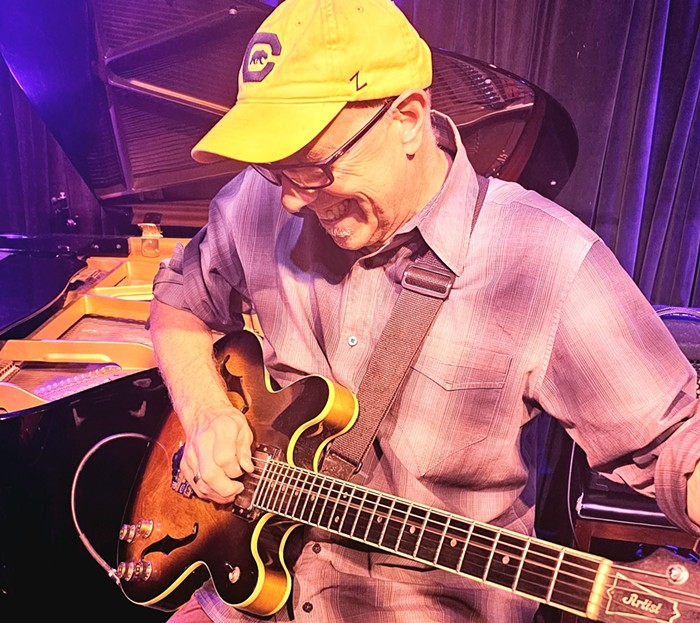PORTLAND TRIO Naked Hour's upcoming debut, Always on the Weekend, is a series of vignettes chronicling the worst breakup ever.
Songwriter, vocalist, and bassist Teal Bluestone's nonlinear storytelling flourishes on what was originally envisioned as a concept album. She revisits what she calls "sentimental specific bullshit" with her lyrics, leaving a trail of metaphorical breadcrumbs as she tries to figure out how the hell she ended up here, coughing up the ashes of a relationship that really, truly crashed and burned. This frustrated disorientation is reflected in swift tempo changes that masterfully smear together fuzzy dream-pop, DIY punk, and twinkly emo.
Naked Hour was initially an experimental bass/drum duo, made up of Bluestone and her friend and longtime bandmate Ethan Conroy. They met as freshmen in high school, and have made music together almost nonstop ever since. Naked Hour seems founded on the impassioned emotional currents connecting its members, so it was a huge change in dynamics when, after admiring another local band, they decided to bring on a guitarist.
"I was watching one of Little Star's earliest shows at Townshend's and I wrote down in my phone, 'Jackson should join Naked Hour,'" Bluestone says of the band's guitarist, Jackson Dean Walker. He and Conroy played together in locally beloved pop-punk/emo four-piece Robot Boy, so Walker wasn't a random choice. Bluestone still does the majority of the singing, but Conroy and Walker contribute to the band's vocals—together they sing the pummeling hook of the album's title track.
Adding guitar leveled out some of the band's more experimental sensibilities. "The Microphones and Mirah were my #1 influences," Bluestone says, "so think about Mount Eerie, think about Phil [Elverum] from Olympia, K Records, all that weird-ass shit he was doing, like, 'I'm gonna go to Iceland and be in this home and only talk to the mountain goats on the side of the road and then I'm gonna make an album...' That was my foundation. And then I realized that I'm not really developed enough as a musician to get to the point where I can just do weird shit. You have to do other stuff first before you can say, 'We're just gonna have one drum, one microphone, and a goat, and this is our band.'"
While there's no goat (yet), Naked Hour makes music that's anything but conventional. While they acknowledge their classical backgrounds, these influences inform rather than inhibit experimentation in their music. Bluestone writes the songs in sections, then brings them to Conroy and Walker. "It's like, 'Okay, I have these three parts, none of them are alike, help me sew them up,'" she says.
Bluestone describes her songwriting as taking "slices" of her life that'll fit into two-minute song-stories. Her stories wildly jump between past, present, and future as she strives to provide the most high-definition picture of all the mountains of shit that led to one specific incident. She's a conversational narrator, using casual language in her lyrics like she's venting to a close friend. Bluestone's voice lilts, swells, and roars, depending on where she's at in the story.
This is exemplified on the record's shortest track, the 72-second "Coffee Splurge." In the same breath Bluestone despondently sings about getting old and spending too much money on coffee, before all three members sing "Woo!" in unison, the perfect musical embodiment of throwing up your hands in fed-up exhaustion.
Always on the Weekend doesn't reach any profound conclusions—its songs play like radio transmissions from the eye of the storm, relaying moments that are both laughably ridiculous and tragic.
"My ex-boyfriend called me a Jewish American princess bitch," Bluestone says.
"We were gonna call the record that," Conroy laughs.
Days before Naked Hour was slated to record, Bluestone sensed that there was one more track she needed to purge. That track was "Maybe I'm Just in My Room," where all the album's angsty energy seems to settle peacefully. It's held together by the key line, "I'm just in my head/Or maybe I'm just in my room," and later, the almost comforting coda, "I think we're just doomed."
Bluestone describes being "at the breaking point of... big life stuff, whenever you have a moment to yourself, whenever you're alone and you're not distracted by everything else that's keeping you going, you just come completely in your head and replay all the fucked-up shit that's recently been going on. I really didn't want to be in my room very much, because I'd be alone and I'd be able to think about it too much and it was actually just too much to handle, to have to think about that by yourself."
Always on the Weekend is bedroom pop that doesn't want to be in the bedroom, the kind that stubbornly resists emotional release because it's not ready to completely let go of the happy moments. This tension seeps into Bluestone's lyrics, but one of the most astounding aspects of Naked Hour's debut is how well Conroy and Walker are able to commiserate with her anguish, then translate their shared experience into music. It's the least lonely-sounding breakup album, because even the most despairing of Bluestone's lyrics are kept afloat by Conroy's explosive but precise percussion, the impressive range of Walker's guitar work, and both of their intensely emotive backing vocals.
"I can't say I pour my emotions into my drumming like Teal does with her songwriting and singing," says Conroy, "but me and Jackson were definitely both there for witnessing a lot of this shit. It made the whole album tighter, that we all knew what it was about."
"I think there's a big, binding theme of how someone that toxic in your life can really, really get screwed up," says Walker. "It just comes into a long transcription of what hoops you have to jump through within yourself in order to then come out at the end of something like that and be okay."


















